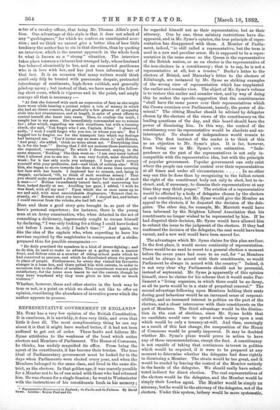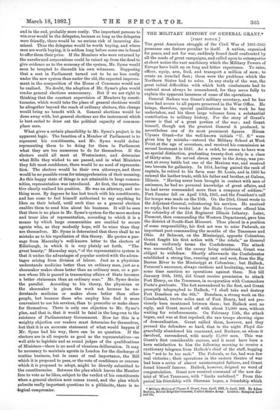REPRESENTATIVE GOVERNMENT IN ENGLAND.* MR. SYME has a very low
opinion of the British Constitution. It is cumbrous, it is unwieldy, it does very little, and even that little it does ill. The most complimentary thing he can say about it is that it might have worked better, if it had not been suffered to get out of order. These faults and failures Mr. Syme attributes to the weakness of the bond which unites -electors and Members of Parliament. The House of Commons, he thinks, has unduly magnified its office. From being the agent of its constituents, it has become their trustee. The true ideal of Parliamentary government must be looked for in the days when Parliaments were elected every year, and when the Members belonged to the same class, and lived in the same dis- trict, as the electors. In that golden age, it was scarcely possible for a Member not to be of one mind with those who had returned him. He was chosen for a single Session ; he went to Westminster with the instructions of his constituents fresh in his memory ;
• Representative Government in England ; its Faults and its Failures. By David Byrne. London : Began Paul and Co.
he regarded himself not as their representative, but as their attorney. One by one, these salutary restrictions have dis- appeared, and in Mr. Syme's opinion, the true principle of repre- sentation has disappeared with them. A Member of Parlia- ment, indeed, "is still called a representative, but the term is used in a new and peculiar sense. He is supposed to be a repre- sentative in the same sense as the Queen is the representative of the British nation, or as an elector is the representative of the non-electors in a constituency ; that is to say, he is not a representative at all, but a trustee." Burke's letter to the electors of Bristol, and Macaulay's letter to the electors of Edinburgh, are instanced by Mr. Syme as striking examples of the wrong view of representation which has supplanted the earlier and sounder view. The object of Mr. Syme's volume is to restore this earlier and sounder view, and by way of doing this he makes the specific suggestion that the constituencies " shall have the same power over their representatives which the Crown exercises over Parliament, namely, the power of dis- missal." The sitting Member should be advised by delegates chosen by the electors of the views of the constituency on the leading questions of the day, and this board should have the power of dismissing him. In this way, the control of the constituency over its representative would be absolute and un- interrupted. No shadow of independence would remain to him. The first instinct of the reader is to think of this as an objection to Mr. Syme's plan. It is far, however, from being one in Mr. Syme's own estimation. "Inde- pendence on the part of the representatives is not only in- compatible with the representative idea, but with the principle of popular government. Popular government can only exist where the people can exercise control over their representatives
at all times and under all circumstances In no other way can this be done than by recognising to the fullest extent the right of the constituent body not only to elect, but to in- struct, and, if necessary, to dismiss their representatives at any time they may think proper." The eviction of a representative would be effected by a body of delegates chosen by the electors of each constituency, but Mr. Syme would give the Member an appeal to the electors, if he disputed the decision of the dele- gates. The other day, for example, Mr. Marriott would have been informed by the Brighton Liberal Association that his constituents no longer wished to be represented by him. If he had disputed their decision, Mr. Syme would have allowed him to submit the issue to the judgment of the electors. If they had confirmed the decision of the delegates, the seat would have been vacant, and a new writ would have been moved for.
The advantages which Mr. Syme claims for this plan are four. In the first place, it would secure continuity of representation. There would be no need to resort to a general election a moment before the seven years had come to an end, for "as Members would be always in accord with their constituents, so would Parliament be always in accord with the country." Indeed, it is not very clear why Parliaments should not be perennial, instead of septennial. Mr. Syme is apparently of this opinion himself, since he claims for his scheme that it would make Par- liament a " living organism, in which there could be no decay, as all its parts would be in a state of perpetual renewal." The second advantage following upon Members holding their seats during good behaviour would be an increased sense of responsi- sibility, and an increased interest in politics on the part of the electors, and a closer intercourse with their constituents on the part of Members. The third advantage would be the diminu- tion in the cost of elections, since Mr. Syme holds that no candidate would care to spend much money upon a seat which would be only a tenancy-at-will. And then, seemingly as a result of this last change, the composition of the House of Commons would be greatly improved. It may be doubted whether Mr. Syme's plans would prove in action to have any of these recommendations, except the first. A constituency is not capable of taking that continuous in terest in politics which would be required, if it were to be prepared at any moment to determine whether the delegates had done rightly in dismissing a Member. The strain would be too great, and it would be evaded by leaving the control of the Member entirely in the hands of the delegates. We should really have substi- tuted indirect for direct election. The real representatives of the electors would be the delegates, and the Member would be simply their London agent. The Member would be simply an
attorney, but he would be the attorney of the delegates, not of the electors. Under this system, bribery would be more systematic, and in the end, probably more costly. The important persons to win over would be the delegates, because so long as the delegates were friendly, there would be no serious risk of incurring dis- missal. Thus the delegates would be worth buying, and where men are worth buying, it is seldom long before some one is found to offer them their price. If the Members who were returned by the unreformed corporations could be raised up from the dead to give evidence as to the economy of the system, Mr. Syme would soon be tempted to discredit his own witnesses. Supposing that a seat in Parliament turned out to be no less costly under the new system than ander the old, the expected improve- ment in the composition of the House of Commons would not be realised. No doubt, the adoption of Mr. Syme's plan would render general elections unnecessary. But if we are right in thinking that the constant supervision of Members by consti- tuencies, which would take the place of general elections would be altogether beyond the reach of ordinary electors, this change would. bring no benefit with it. General elections would be done away with, but general elections are the instrument which is best suited to draw out the political capacity of common- place men.
What gives a certain plausibility to Mr. Syme's project is its apparent logic. The function of a Member of Parliament is to represent his constituents, and Mr. Syme would define representing them to be doing for them in Parliament what they are too numerous to do for themselves. If the electors could all meet at Westminster, and determine what Bills they wished to see passed, and in what Ministers they felt most confidence, there would be no need of representa- tion. The electors would be their own attorneys, and there would be no possible room for misapprehension of their meaning. As this happy state of things is not attainable in large commu- nities, representation was introduced. At first, the representa- tive clearly realised his position. He was an attorney, and no- thing more. By degrees he has lost touch with his constituents, and has come to feel himself authorised to say anything he likes on their behalf, until such time as a general election enables them to send him about his business. It will be seen that there is no place in Mr. Syme's system for the more modern and truer idea of representation, according to which it is a means by which large communities are enabled to secure agents who, as they modestly hope, will be wiser than they are themselves. Mr. Syme is determined that there shall be no mistake as to his repudiation of this theory. He quotes a pas- sage from Macanlay's well-known letter to the electors of Edinburgh, in which it is very plainly set forth. "The great beauty," Macaulay says, " of the representative system is that it unites the advantages of popular control with the advan- tages arising from division of labour. Just as a physician understands medicine better than an ordinary man, just as a shoemaker makes shoes better than an ordinary man, so a per- son whose life is passed in transacting affairs of State becomes a better statesman than an ordinary man." Mr. Syme denies the parallel. According to his theory, the physician or the shoemaker is given the work not because he un- derstands medicine or makes shoes better than other people, but because those who employ him find it more convenient to use his services, than to prescribe or make shoes for themselves. There is only one objection to Mr. Syme's plan, and that is, that it would be fatal in the long-run to the existence of Parliamentary Government. How far this is a weighty objection our readers must determine for themselves, but that it is an accurate statement of what would happen if Mr. Syme had his way, there can be no question. If the electors are in all respects as good as the representatives—as well able to legislate and as sound judges of the qualifications of Ministers—there is no need of vicarious deliberation. It may be necessary to maintain agents in London for the discharge of routine business, but in cases of real importance, the Bill which it is proposed to pass, or the vote of confidence or censure which it is proposed to adopt, might be directly submitted to the constituencies. Between the plan which leaves the Member free to vote as he likes, subject to the verdict of his constituents when a general election next comes round, and the plan which Submits really important questions to a pldbiscite, there is no ;logical compromise.



































 Previous page
Previous page